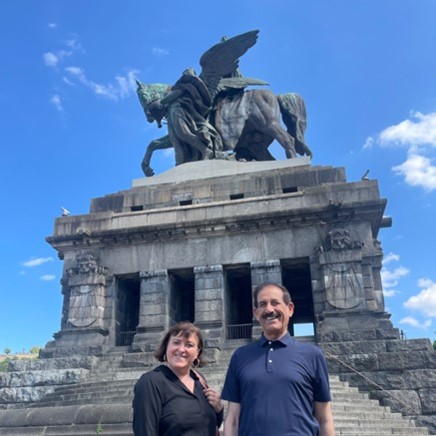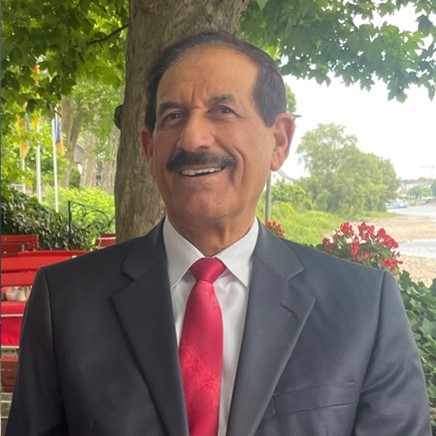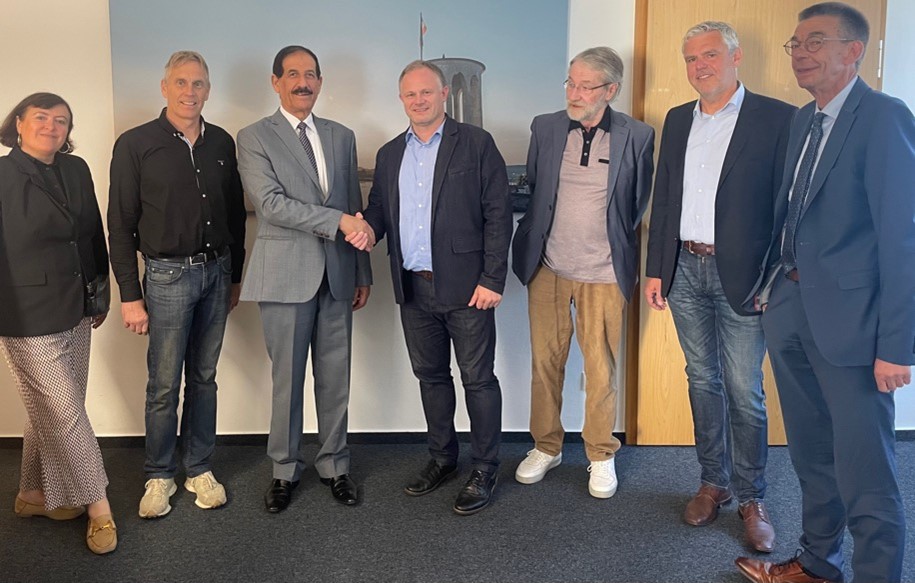Outside perspective on Germany, its upheavals and new beginnings: Interview with Iraqi professor and politician Abid Al Ajeeli
with Birgitt Smelty during a walk along the Rhine
Prof. Dr. Abid Al Ajeeli, Head of the Arab Council for Strategy, Economics and Development Studies, has visited Germany many times during his 40-year career as an Iraqi professor of computer science and politician for higher education and scientific research. On the occasion of the 35th anniversary of German reunification, we spoke with him about his view of Germany with its upheavals and transformations.


Professor Al Ajeeli, you come from Iraq, a country that has undergone numerous upheavals and is currently undergoing complex changes. What do you associate with the enormous upheaval of German reunification?
I still remember well when, on 9 November 1989, the citizens of the former GDR themselves paved the way for a new era in Germany with the fall of the Berlin Wall. It was a historic moment, joyful, peaceful and full of hope. This news sparked sympathy not only in me, but in almost every region of the world. When the treaty between the Federal Republic and the GDR was signed on 3 October 1990, no one could predict what the reunification of two societies and states with very different systems would mean for German citizens in the east and west. But people had faith: Germany would overcome this upheaval, no matter how difficult the task might be. Major transformations take time – usually more than one might initially think.
„Major transformations take time – Usually more than initially thought.“
You had to leave your homeland in 2001. What was the situation like for you? And how do you see the loss of the state for the East German population?
It wasn’t easy for me when I had to leave my hometown Baghdad, my family and my friends in 2001. But I was to find a second home, new career prospects and new friends in Qatar. Experiences like this teach you that loss and new beginnings are two sides of the same coin. I imagine that this event was very challenging for the citizens of the former GDR. They lost their country, their working environment and their social framework. They had to completely reorient themselves and were given a whole new identity in the Federal Republic. Major upheavals require willpower and perseverance. But with the shared vision of ‘Together – for each other. Never again against each other.’ – the German population has resolutely set out on the path to a united future. This shows that those who are prepared to let go of the old can gain something new.
„Who are prepared to let go of the old can gain something new.“
Your home country is a parliamentary republic with a young population and many religions. In Germany today, 30% of people have a migrant background. This often leads to misunderstandings and tensions. What attitude do you recommend to people living in Germany?
How do they say it in Germany? ‘Where there’s a will, there’s a way.’ I myself live in a region with a long-standing, complex and highly conflictual dynamic. It’s not easy, but it is possible. The prerequisite is that every person deserves respect, regardless of their origin. In Germany, society is ageing and shrinking. For the system to continue functioning, additional people from abroad are needed. Personally, I see the advantages of a diverse society. It opens up new perspectives, increases innovative strength and enables joint action to find new solutions. In my opinion, the right approach is to seek common ground rather than emphasise differences.
From what I have seen of people in Germany, with their realistic, pragmatic mentality, they will master this situation too.
„Seeking common ground instead of emphasising differences.“
The younger generation in Germany is facing a great deal of uncertainty in light of climate change and numerous global crises and catastrophes. Nevertheless, they must build a future for themselves. You know this feeling because you personally had to cope with wars and losses. What advice would you give to the younger generation?
We are in the midst of global upheaval triggered by climate change, cultural conflicts, economic crises and technological developments. People around the world are facing a multitude of crises that have individual implications. At the same time, young people in particular still have to build their own lives. I know this feeling all too well and had to learn very early on to accept new realities, let go of the old and create a new life for myself. What helped me? My positive outlook, my belief in myself and my willingness to learn. This inner attitude gives us the strength to overcome even difficult situations in life and can be a source of strength for the younger generation. I am therefore all the more delighted that my long-standing German friend Claus Raemer has given me the opportunity to talk to young people from the ‘Rasselstein Quartier’ technology campus in Neuwied. They are looking forward to collaborating with the younger generation from my region on forward-looking education, research and employment programmes.
What helped you most in dealing with an uncertain life situation? How can we achieve transformation?
Education, knowledge and continuous learning are the driving force behind transformation, progress and innovation for every individual and every society. This is not just an abstract theory – I have experienced it myself. The willingness to never stop learning, to adapt and to integrate new ideas has helped me through all crises. That is why I am confident that, together, we can work more efficiently across borders to shape a better future that protects the environment, ensures social stability and distributes prosperity more fairly. Germany has a long-standing education and training system that dates back to 1818 and began with dual vocational training that combines practice and theory. This tradition of education is a great treasure that must be preserved and developed further – especially in times of change.
Professor Al Ajeeli, what are your hopes for the future of the younger generation in Germany and Iraq?
Above all, I wish young people in both countries one thing: the willingness to reach out to each other and learn from each other. German youth can learn from the resilience and adaptability of young Iraqis, who do not give up despite all adversities. And Iraqi youth can benefit from Germany’s structured education system and its innovative strength. Both generations share similar challenges – climate change, economic uncertainty, the search for their new role in a globalised world. If they work together to find solutions, forge friendships across cultural boundaries and pool their different experiences, they can shape a future that creates prosperity, peace and prospects for both societies. The cooperation in the Rasselstein neighbourhood is a hopeful start – may it bear fruit and lead to many more bridges being built.
Professor Al Ajeeli, thank you very much for this inspiring conversation and your unifying words.

From left to right: Birgitt Smelty, Christian Scheidgen, Prof. Dr. Abid Al-Ajeeli,
Jan-Einig, Claus Raemer, Fred Häring und Martin Hahn
Downloads & more info
Image rights Smelty + Partners
More about Prof. Dr. Abid Al Ajeeli
More about Kaiser-Wilhelm-Denkmal
More about Wirtshaus “Leyscher Hof”
